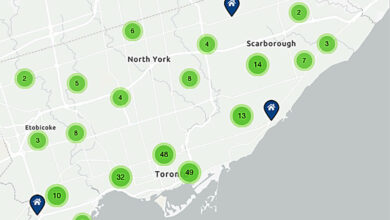“It is not uncommon right now for one nurse to be caring for 30 or even 50 patients”
In the midst of a health care crisis in Canada, countless professionals from every branch of the health system are being affected. Among them, we find a group of workers that is significantly being affected and whom the system cannot survive without: the nurses. The pandemic has worsened the nursing shortage, as overworked and ill-treated health-care workers have quit in massive numbers.
A recent survey of 2,500 nurses found that 64% are looking to leave the health care profession, a nearly 40% increase from a similar survey conducted a year ago. Three quarters of those surveyed said they have experienced burnout since the Covid-19 pandemic began and half said they had suffered feelings of trauma, extreme stress or post-traumatic stress disorder. These professionals also have talked about insufficient funding for the system to work properly. We asked the Ontario Nurses’ Association about their struggles and what they envision for a health care system that is in need of care itself.
MS: Ontario has been facing several challenges, such as long waiting hours in the emergency, delayed surgeries and even lack of professionals. What are the underlying issues causing this scenario?
Ontario Nurses’ Association: There are many significant issues. Our hospitals, public health units and home and community care – as well as nursing homes and long-term care – have been grossly unfunded, and the Ford government cut funding to public health units prior to the pandemic. Ontario has a shortage of nurses, more than 22,000 are needed just to catch up to the national average. The shortage was predicted by ONA and others decades ago – we knew we had an aging population and action could have been taken if there was the political will to do so. Instead, the Mike Harris PC government cut 10,000 RNs and closed hospital beds, famously likening nurses to hula hoops – a fad. Underfunding health care and cutting RN care are two reasons why health care is in the state that it is today. The Ontario Nurses’ Association has solutions that would address health-care shortcomings.
MS: What concerns you the most about the near future?
ONA: Staffing is the most urgent issue that is facing health care right now. There are not enough nurses to care for our patients, residents and clients. Nurses have quit, retired, gone to other places with better pay and working conditions. Many are infected with COVID-19 and have suffered physical and mental injuries. It is not uncommon right now for one nurse to be caring for 30 or even 50 patients. This is unsafe for patient care, and unsafe for the nurses who are trying to keep up. Nurses are working 16 and sometimes 24-hour shifts, then being called in on their days off. Nurses are leaving the profession because they are absolutely fed up with being disrespected by the Ford government and employers. Nurses and health professionals have worked tirelessly – and risked their health and lives – to care for Ontarians. Premier Ford must act now to improve patient care, and ONA has the solutions.
MS: We know how hard it was for front-line workers to go through the Covid-19 pandemic. Are these professionals still feeling overwhelmed and is this still having an impact on the system?
ONA: After more than two years of a global pandemic, of nurses lacking proper personal protective equipment at the start, of unprecedented tragedy in our province, RNs are burnt out, exhausted, suffering PTSD and moral distress, not to mention sickened with COVID and suffering long-term impacts. Entering the pandemic with the worst RN-to-population ratio in the country was not helpful. The Ford government also subjected nurses and health-care professionals to Bill 124 – legislation that unfairly suppressed their wages. Nurses deserve the wages they fairly negotiated in their contracts. Nurses and health professionals continue to be significantly impacted by the pandemic and the lack of respect the government has shown.
MS: What are the most urgent measures that you think that need to be taken or changes that you would like to see implemented?
ONA: There are solutions and we have urged this government to work with ONA to implement them. We need a plan to retain the nurses we currently have, return nurses who can be providing care, and recruit and mentor the next generation of nurses. First, repeal Bill 124. This will help stem the exodus of nurses from the profession and keep more of them at the bedside to care for Ontarians. It will help retain our seasoned nurses and allow them to train the next wave of new nurses. We need to support nurses improving mental health supports. The rise of violence against nurses and the stress and strain of being front-line caregivers during the COVID-19 pandemic has made access to mental health services a top priority. The moral injury and rates of post-traumatic stress disorder, exhaustion and burnout have skyrocketed. Additionally, Ontario must return and reintegrate nurses into the public health-care system. This should include finding faster pathways for Internationally Educated Nurses to safely practice in Ontario, returning recently-retired nurses and addressing the widespread use of high-cost private agency nurses. Ontario must put the brakes on privatizing health care. Private clinics have higher rates of patient complications and deaths, worse infection control measures and take desperately needed tax dollars away from the more equitable public health-care system. They will take even more health-care professionals out of the public system, increasing wait times for those who cannot afford to pay.









Redes Sociais - Comentários